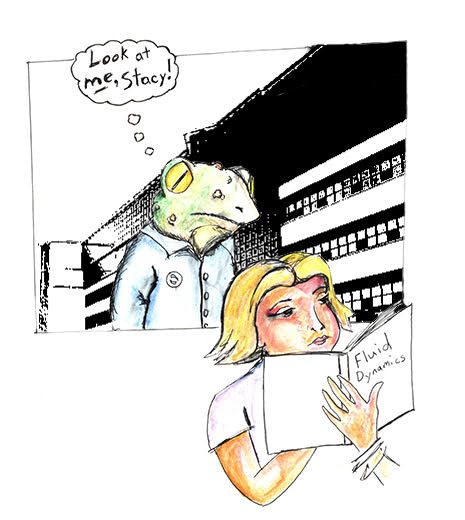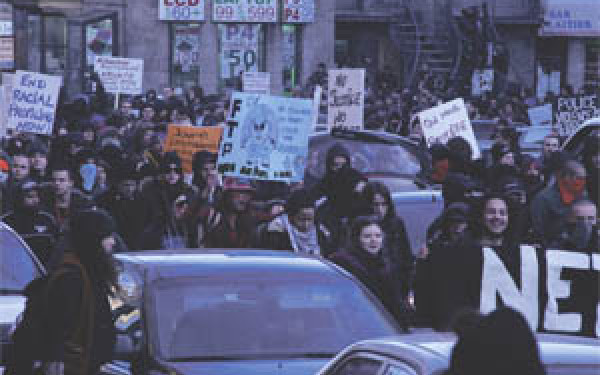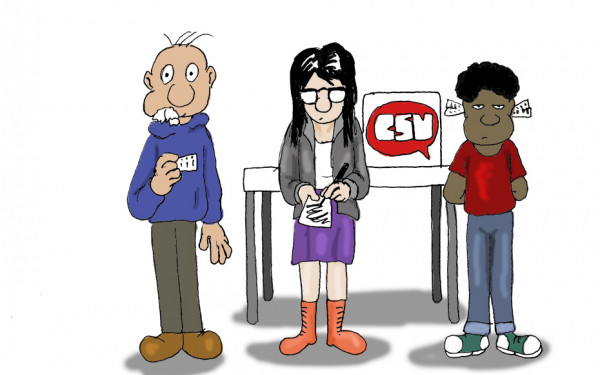Polytechnique Is No Longer an Isolated Incident
A People’s History of Canada Column
This year, it will have been 30 years since the Polytechnique shooting, which claimed the lives of 14 promising women engineers.
The shooter, Marc Lépine, was a spurned engineering applicant who felt women took what he thought was his rightful place. We still think solemnly of the brilliant engineers that could have been, these sisters and daughters, friends and family members, taken away from their loved ones violently by someone full of blind hatred. Someone who wanted them dead just for being born as they were, for daring to want what he felt was his birthright as a man. We still hold ceremonies and vigils, that I dutifully attend and bear in mind, and as people whisper or think “never again,” a chill runs down my very core.
Coming from a troubled home and childhood, Lépine was himself a troubled person. While he blamed many, including women, for his shortcomings in life, the truth is that women had nothing to do with his failures. He applied to study engineering, and was rejected because he had prerequisites to complete first. He was rejected a second time for incomplete prerequisites a few months later. On Dec. 6 1989, after months of planning, the 25 year-old walked into Polytechnique and shot 28 people, killing 14 women.
He felt women were taking his place, that women didn’t belong in male-dominated professions like engineering. His manifesto found among his possessions was clear about this, and he even enclosed a list of notable feminists he would have killed had he had the chance on his suicide note, like CBC reporter Francine Pelletier. Lépine turned the gun on himself before he could be arrested, and although he’s dead, the memory of this day isn’t. Every year, Montrealers put on a vigil to honour the memory of the dead and reflect on ongoing misogyny. The memory of the events of this day remain haunting. As a woman, I know better than to think events like the Polytechnique shooting are left in the past, however.
In the last few years, we have seen the incel—or involuntary celibate—movement, go mainstream.
The meaning of the term is found in the growing movement of involuntary celibacy or virginity being blamed on the entire female population. Following their ban from Reddit (they have since resurfaced in differently-named subreddits), screenshots give a dark glimpse into some of the mentalities and ideas of how to treat women who refuse to put out. While their views are both dangerous and toxic, the movement was basically treated as a joke. That changed pretty quickly, though.
In May 2014, Elliot Rodger killed six people in Isla Vista, California. A video posted to YouTube and emails sent out before he killed himself following the attack became the manifesto of the growing incel movement. Rodger’s 141 page manifesto provided a view into his mental state and hatred of women, fueled by the resentment of his own virginity.
“Women are like a plague. They don’t deserve to have any rights. […] Women are vicious, evil, barbaric animals and they need to be treated as such. […] All women must be quarantined like the plague they are, so that they can be used in a manner that actually benefits a civilized society.”
Rodger goes on to describe his ideal world, a dictatorship where women are put in concentration camps and starved to death, which he states would be a pleasure to watch. “If I can’t have them, no one will.” Rodger referred to the day of the massacre he carried out as the “Day of Retribution.”
“Why was I condemned to live a life of misery and worthlessness while other men were able to experience the pleasures of sex and love with women?” the manifesto reads. Psychology Today took a stab at examining the mental state of Rodger, and they cleverly pointed out that when his mother alerted police about her son’s worrisome behavior, police left after seeing his timid comportment.
Police failed to uncover his YouTube channel, the manifesto, and even frightening Facebook comments he wrote before the killing spree. Researcher Amy Broadway made parallels between Rodger’s behavior and narcissistic personality disorder, with a particular hatred for women. We see here, and in the case of the Polytechnique shooter, a disturbing trend of entitlement and self-centeredness that becomes apparent in other cases of incel violence.
The manifesto is available to incel communities online, and circulation of such ideas to like-minded men has contributed to Rodger being worshipped by those with the same mindset.
Alek Minassian, the Toronto murderer who drove into and killed 10 pedestrians on Yonge St. in April 2018, explicitly hailed Rodger as the “Supreme Gentleman” on Facebook, and referred to his subsequent massacre as an “incel rebellion.” Unlike Rodger, neither Minassian or Lépine were known to police, and no previous signs of violence were visible. This shows that past trouble with the law isn’t always related to these murderous sprees.
In October 2018, Scott Beierle went to a hot yoga studio in Florida and killed two women while injuring five others. CNN reported that the shooter had been arrested on two prior occasions for having groped women and for trespassing on the Florida State University campus to do so. He was not convicted on the groping and trespassing, and died by suicide shortly after his spree. Nancy Van Vessem and Maura Binkley, killed in the shooting, both had promising years of life ahead, robbed from them by the same man who sought to rob women of their physical agency as well. Buzzfeed revealed videos of him calling women sluts and whores, lashing out at women dating people of other races as having “betrayed their blood.” This is a different facet of misogyny from what Lépine had expressed, but misogyny is multifaceted and can change with the times and the people.
One of the videos Beierle made, titled “Plight of the Adolescent Male,” sympathized openly with Rodger and claimed solidarity in not “Getting any, no love, no nothing.” In another video called “The Rebirth of My Misogynism,” Beierle lists the names of women he knew, from the eighth grade until his term in the army began, who he blames for him identifying as a misogynist. This list is similar to the one in the manifesto-suicide letter of Lépine, where he listed the feminists he would have killed if he had the opportunity.
Beierle’s video also mentions a woman who stood him up on a date, saying he “Could have ripped her head off.” He uploaded a song to SoundCloud called “Locked in My Basement” where he describes a woman he keeps in his basement as a prisoner using chains to facilitate raping her. YouTube and SoundCloud have since removed his songs, but only after Buzzfeed’s reporting.
Chris Harper-Mercer, who in 2016 killed 10 at Umpqua Community College in Roseburg, Oregon, cited wanting to get revenge for being “26, with no friends, no job, no girlfriend, a virgin.” He also saluted Rodger. Many other examples of shootings exist a simple Google search away.
How then is Polytechnique an isolated incident? It looks like only the beginning of misogynists with guns committing acts of violence.
Feminist writer Jessica Valenti points out that in several mass shooting deaths in recent American history where the motive is not specifically misogyny, the men in question often have misogynistic tendencies appearing in their troubled past alongside domestic abuse allegations. Polytechnique was not the beginning of mass violence against women or the mentality behind it, but we can find similar traces of Lépine’s mentality and narcissism beneath the surface of many other mass shooters.
The internet has become a battlefront for women, and ground zero for the radicalization of men and organized violence. The internet provides a discreet, often anonymous way to get caught up in hatred and slide down the digital rabbit hole. Whereas before it may have been easier to catch certain changes in people, expressions online can be made unbeknownst to close ones. Nowadays, even light frustrations can lead down this path, when too much time is spent consuming and ruminating in these forums and isolating oneself from society.
We cannot allow grown men to blame women for their own failures and shortcomings. To keep myself from feeling heartbroken as the thirtieth anniversary of Polytechnique approaches, I focus on what we can fix. The problem is closer to home than we think, perhaps somewhere in the neighbours’ computer, one subreddit or visit to 4chan away from our own fingertips.
One can put roadblocks between the man and the gun, but until we address the hate, we will never be rid of the issue, we’ll only delay it. These groups and people need to be monitored before more acts of terror occur, and the warning signs are there already. The internet is a hotbed for organizing these attacks. If the incel community and their vision of violent repression of women was viewed as real hate speech, rather than the rumblings of sad internet trolls, we might have busted some of these inciters of violence before women had to die for these men’s virginity or lack of career motivation. As we see the lights go up each year in their memory, think of these women, and all the women who have died at the hands of hateful men since. Commit to fighting this mindset anytime you can, anyway you can.




_600_375_s_c1.png)

